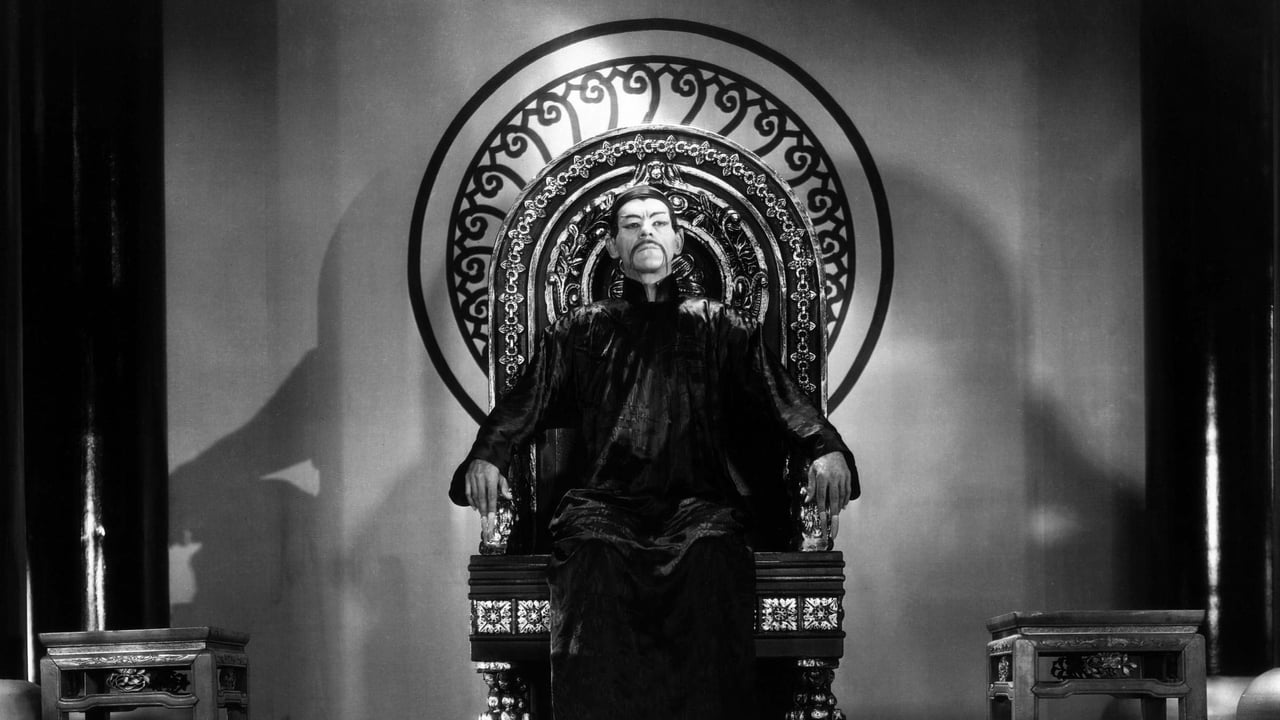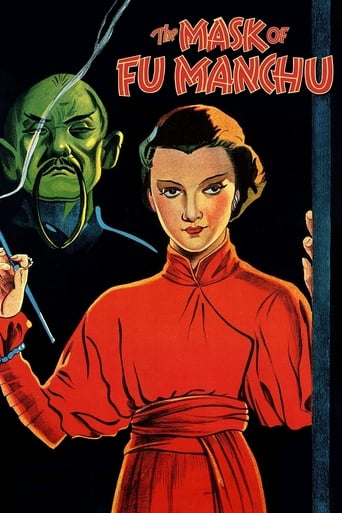

Hokey, campy, and highly entertaining. This movie is a bit more of a thriller along the lines of Indiana Jones than it is a horror film, but there are many cool touches packed into its 68 minutes. The race is on to get to the tomb of Genghis Khan, and we first see Boris Karloff in the role of Fu Manchu with his exaggerated facial features further distorted in a convex mirror, sporting absurdly long fingernails, and drinking a bubbly, steaming concoction. Later we'll see him torturing a captive with a giant gong, and presiding over an operating room which has lizards and snakes clamoring to get out of jars, a giant python, and a tarantula he extracts poison from. The sinister operation is presided over by the inscrutable Myrna Loy with her cat-like face, calming smoking what appears to be a hookah, as well as a bunch of bare-chested African-American guys on pedestals with arms crossed. Injections are needed for one of the captives to make him Loy's "more than willing slave, until of course she tires of him" – loved that. There are also a couple of death traps that will remind you of 007 films from 30 years later, including an alligator pit, and how can you not love a laser scene from 1932? It's all truly over the top, and the sets are fantastic.Is the film racist? Well, yes, but I found it less disturbing than others from the time period. Despite the whitewashing of Hollywood – Karloff, Loy, and other Caucasians in Asian roles – I liked the strength of their characters, in direct contrast to the more common fawning, servile roles. Then again, Karloff bellows "Kill the white man, and take his women!" towards the end, in what likely directly stoked the "yellow fear" of the day. Still, I took more offense to the gap-tooth, goofy waiter ringing the dinner bell at the end, than I did to Karloff or Loy. You have to be able to forgive the filmmakers a bit, but if you can, I think you'll enjoy this one too.
... View MoreThis film's stagnant characterization was a huge obstacle to my enjoyment of the film Overt racism aside, its more subtle stereotyping through each actor's characterization added insult to injury; not only were the characters constant and static throughout the story, but their original personalities and behaviors were modeled off such clichéd tropes that I could not even have an initial appreciation for each character. For example, just as Fu Manchu is the epitome of evil as the archetypal "mad scientist" villain, the white men (especially Dr. Nayland Smith) are steadfastly "good" as brave, noble heroes. Further, Fu Manchu's daughter embodies the two typical stereotypes associated with Asian women: exotic temptress and submissive object. She is either ordered around by her father as his "ugly and insignificant daughter," or she is making moves toward a captive Terry in her bizarre, sadistic sexual manner. These racist ideas are imposed upon her, yet she herself is never given an identity or even referenced to as an individual. Rather, she always appears and acts in relation to the men of the film.Thus, in addition to the clear racist comments and portrayals of supporting characters , it's this stagnantly sexist and racist characterization that was most problematic for me in "The Mask of Fu Manchu." In stark contrast to the plot, which morphed into a variety of situations throughout the movie, the characters of this film, whether good or evil, Western or Eastern, were altogether uninspired and wearisome.
... View MoreIs it possible to be racist and entertaining? Sure. And if you doubt it, take a look at "The Mask of Fu Manchu." On one side, we have a group of nobly dedicated scientists and historians searching for the gold mask and sword once wielded by Ghengis Khan. On the other, we have cunningly evil Boris Karloff, his sloe-eyed daughter, Myrna Loy, and a horde of thugs determined to wipe out the white race. Any doubt who's gonna' come out on top? Fortunately, Karloff's performance in the title role is so demonically wicked, you're almost tempted to say let the villains win for a change. But no, our lucky band of crypt-invaders including Lewis Stone and Charles Starret (before he became a full-time cowboy) aren't about to allow a few thousand raving thuggies get the upper hand. No way this movie could be made now. But back in those more innocent -- and dreadfully naive days -- it wasn't a problem. And even if the racism makes you cringe, Karloff's performance is a class act.
... View MoreThis movie is strongly driven by a logic of Orientalism. In other words, the British men who are on a mission to "save the world" from Fu-Manchu are actually representative of the "West," and Fu-Manchu is representative of the "East." Historically, the Western civilizations have been put on a direct opposition to Eastern civilizations. The "East," or the "Orient" has repeatedly been framed as a threat, and as the enemy. This movie is a very accurate demonstration of this idea.Fu-Manchu is (or should be), by his nature of being a Chinese man, inferior to the White men. However, because he was able to get three doctorates from Western education, he is able to use this intellect and turn it against the Western empire. Therefore, the White man's empire must be protected by moral, strong, and superior British men. This reasoning is not a simple storyline that is encapsulated within a single movie. The idea that the modern day's audience should simply "ignore" or "take into consideration" the time period in which this movie was made in is not a reasonable request. The ideas that exist in this movie represent a much larger societal and political perspective that Orientalism is a justification and an anchor for war, and this perspective is not only alive, but it is alive and well in our modern society. Therefore, I urge you to think about these concepts as you watch the movie.
... View More